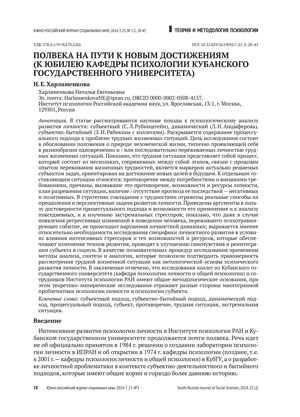Abstract
The paper examines three scientific approaches to psychological analysis of personality development: the subjective approach (S. L. Rubinstein), the dynamic approach (L. I. Antsyferova), and the subjective-existential approach (Z. I. Ryabikina and colleagues). The author discloses the fundamental aspects of a procedural approach in addressing complex life challenges. The objective of the research is to substantiate a statement on the nature of human life, which is typically manifested in a multitude of challenging life situations experienced simultaneously and/or successively by an individual. A challenging situation is defined as a process comprising multiple stages, linked to the subject’s past experiences of addressing life difficulties, serving as a marker of their current tasks, and oriented towards the achievement of future objectives. The individual components of the situation include the contradiction between needs and external requirements, the reasons that caused this contradiction, the capabilities and resources of the individual, the plan for resolving the situation, and the presence or absence of a forecast of its consequences, both negative and positive. The strategies of coping with difficulties reflect authentic methods of overcoming them and prospective tasks of personal development. This paper presents arguments in favor of the procedural approach and the possibility of its application to the analysis of everyday and extreme stressors. It is shown that there is no violation of personal dynamics even in the case of regressive changes in the behavior of an individual who has experienced a psycho-traumatic situation; an opinion is expressed on the need to study the specificity of personality development in conditions of intensive stressors, as well as the opportunities and resources that ensure a change in the pace of development, leading to the improvement of the subject’s well-being and his/her reintegration into society. The research employed the methods of analysis, synthesis, and analogy as cognitive procedures, which permitted the validation of the hypothesis that a challenging life situation can be considered an ontological basis for the development of personality. The conclusion is that the studies conducted by colleagues from Kuban State University (the Department of Personality Psychology and General Psychology) and by researchers at the Institute of Psychology of the Russian Academy of Sciences shared a common methodological basis. The theoretical and empirical studies reflected different aspects of multifaceted problems in personality psychology and the subject’s psychology.
Keywords
References
Абульханова, К.А. (1973). О субъекте психической деятельности. Москва: Наука.
Абульханова-Славская, К.А. (1997). Проблема личности в психологии. В К.А. Абульханова-Славская, Л.И. Анцыферова, А.В. Брушлинский (ред.) Психологическая наука в России ХХ столетия: проблемы теории и истории (сс. 270–374). Москва: Институт психологии, Российская академия наук.
Анцыферова, Л.И. (1981). О динамическом подходе к психологическому изучению личности. Психологический журнал, 2(2), 8–18.
Анцыферова, Л.И. (1990). Личность с позиции динамического подхода. В Б.Ф. Ломов, К.А. Абульханова-Славская (ред.) Психология личности в социалистическом обществе. Личность и ее жизненный путь (сс. 7–17). Москва: Наука.
Анцыферова, Л.И. (1993). Психология повседневности: жизненный мир личности и «техники» ее бытия. Психологический журнал, 14(2), 3–17.
Анцыферова, Л.И. (1994). Личность в трудных жизненных условиях: переосмысливание, преобразование ситуаций и психологическая защита. Психологический журнал, 15(1), 3–18.
Анцыферова, Л.И. (2004). Развитие личности и проблемы геронтопсихологии. Москва: Институт психологии, Российская академия наук.
Асмус, В.Ф. (1969). Избранные философские труды. Москва: Издательство Московского университета.
Головей, Л.А., Стрижицкая, О.Ю. (2016). Особенности структуры повседневных стрессоров и ресурсов личности в разные периоды взрослости. В Е.А. Сергиенко, А.Л. Журавлев, Н.В. Тарабрина, Н.Е. Харламенкова (ред.) Психология повседневного и травматического стресса: угрозы, последствия и совладание (сс. 27–49). Москва: Институт психологии, Российская академия наук.
Дубровский, Д.И. (2011). Единство гносеологического и онтологического аспектов категории идеального. NovaInfo, 6. Режим доступа https://novainfo.ru/article/2188.
Дымова, Е.Н. (2022). Проявление признаков психотравмирующего опыта в трудных жизненных ситуациях. В Н.Е. Харламенкова, Е.А. Сергиенко, В.В. Знаков, Н.Н. Казымова (ред.) Онто- и субъектогенез психического развития человека (сс. 278–291). Москва: Институт психологии, Российская академия наук.
Дымова, Е.Н. (2023). Трудные жизненные события в представлении мужчин и женщин юношеского возраста. В З.И. Рябикина, Л.Н. Ожигова, А.Ш. Гусейнов (ред.) Личность в изменяющейся социальной реальности: общение и со-бытийность (сс. 141–145). Краснодар: КубГУ.
Рождерс, К. (2002). Искусство консультирования и терапии. Москва: Апрель Пресс, изд-во Эксмо.
Рубинштейн, С.Л. (1958). О мышлении и путях его исследования. Москва: изд-во АНСССР.
Рябикина, З.И. (2005). Кафедра — это переплетение многих судеб, многих личных дискурсов в науке. Человек. Сообщество. Управление, 4, 56–65.
Рябикина, З.И. (2008). Субъектно-бытийный подход к изучению развивающих личность противоречий. Психологический журнал, 29(2), 78–87.
Рябикина, З.И., Ожигова, Л.Н., Фоменко, Г.Ю. (2013). Развитие идей субъектного подхода в исследованиях психологов Кубанского государственного университета. Психологический журнал, 34(2), 60–69.
Стрижицкая, О.Ю., Головей, Л.А. (2018). Дифференциально-психологические аспекты восприятия повседневных стрессоров. Психологический журнал, 39(5), 15–25.
Трубников, Н.Н. (1987). Время человеческого бытия. Москва: Наука.
Харламенкова, Н.Е. (2016). Переживание утраты в пожилом возрасте. В М.И. Воловикова, А.Л. Журавлев, Н.Е. Харламенкова (ред.) Психологические исследования личности: история, современное состояние, перспективы (сс. 169–191). Москва: Институт психологии, Российская академия наук.
Харламенкова, Н.Е. (2023). Динамический подход к психологическому исследованию личности Л.И. Анцыферовой: новые грани проблемы. В А.Л. Журавлев, Е.А. Сергиенко, Г.А. Виленская (ред.) Научные подходы в современной отечественной психологии (сс. 461–477). Москва: Институт психологии, Российская академия наук.
Anders, S.L., Frazier, P.A., Shallcross, S.L. (2014). Changes in Functioning Following Potentially Traumatic Life Events in College students. Psychological Trauma: Theory, Research, Practice, and Policy, 6, 99–106. DOI: 10.1037/a0033835
Fritzson, E., Zhang, N., Wolchik, S.A., Sandler, I.N., Tein, J.-Y., Bellizzi, K.M. (2024). Developmental Pathways of the Family Bereavement Program to Promote growth 15 Years after Parental Death. Journal of Family Psychology, Advance. DOI: 10.1037/fam0001189
Haehner, P., Kritzler, S., Fassbender, I., Luhmann, M. (2022). Stability and Change of Perceived Characteristics of Major Life Events. Journal of Personality and Social Psychology, 122(6), 1098–1116. DOI: 10.1037/pspp0000394
Liao, H.-W., Bluck, S. (2023). Recalling Self-Disruptive Events and Maintaining Self-Continuity in Adulthood. Psychology and Aging, 38(1), 17–29. DOI: 10.1037/pag0000719
Schwaba, T., Denissen, J.J.A., Luhmann, M., Hopwood, C.J., Bleidorn W. (2023). Subjective Experiences of Life Events Match Individual Differences in Personality Development. Journal of Personality and Social Psychology, 125(5), 1136–1156. DOI: 10.1037/pspp0000483
Zhang, N., Bai, B., Zhu, J. (2023). Stress Mindset, Proactive Coping Behavior, and Posttraumatic Growth among Health Care Professionals during the COVID‑19 Pandemic. Psychological Trauma: Theory, Research, Practice, and Policy, 15(3), 515–523. DOI: 10.1037/tra0001377


